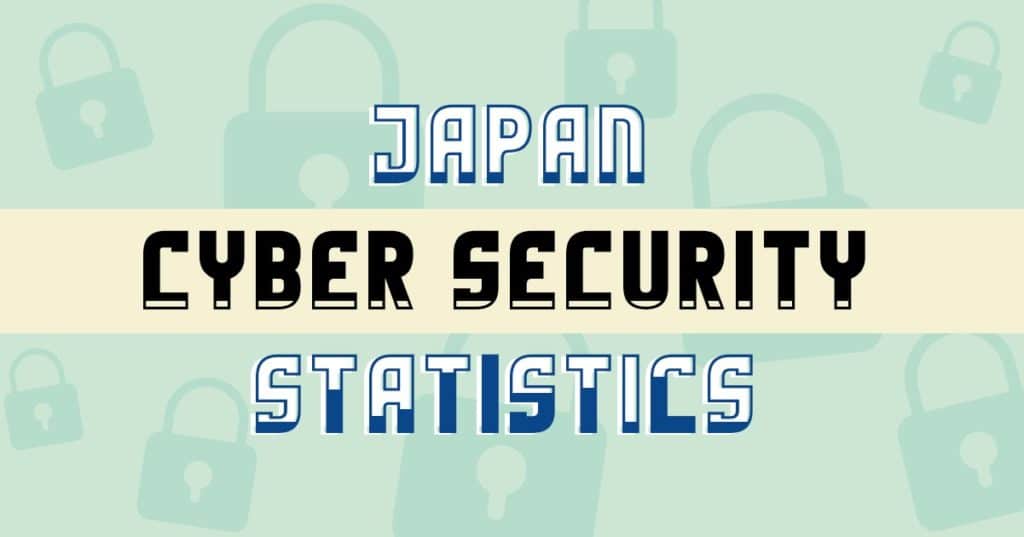Japan Cyber Security Statistics (Updated for 2024)

Cyber security isn’t something that concerns only one region of the world. Everybody connected to the internet is exposed to various forms of security threats, including hackers, malware, phishing, zero-day attacks, ransomware, etc.
As the world continuously becomes more digitized, cyber security is more important than ever. Statistics show that as of January 2021, there were almost 117 million active internet users in Japan. However, cyber security has become a pressing issue in Japan because the country’s financial market depends on the internet, electronic devices, and other forms of technology.
We’ll take a closer look at the facts and figures related to Japan’s cyber security, so you can get a clearer picture of how secure the country’s cyberspace is.
The Rate of Cyber Crime in Japan
About 42% of the internet users in Japan have experienced one form of cybercrime or the other. This is a high figure, considering that Japan is one of the most cyber-secure countries. These cyber crimes have affected individuals, organizations, and even government agencies.
For example, data breaches that started from Fujitsu’s “ProjectWEB” information training tool affected Japanese government agencies. The attack affected the Japanese Ministry of Land, Infrastructure, Transport, Tourism, the Cabinet Secretariat, and the Narita International Airport. The hackers stole 76,000 email addresses and email system settings.
Furthermore, there was a noticeable spike in the rate of online banking fraud in Japan in 2019. According to data gathered, the amount of money lost by victims of online banking frauds rose to more than 2.5 billion Japanese yen.
In 2020, the Japanese police recorded 887 cases of suspected cyber crimes related to COVID-19. In some cases, customers paid for face masks on online shopping platforms, but they never received the products they paid for.
The Most Common Types of Cyber Crimes in Japan
Over the years, Japan has been a major target for cybercriminals. These malicious characters carry out different illegal activities on the internet, but in some cases, the law eventually catches up to the bad actors. As a result, cybercriminals in Japan have different targets in terms of the nature of their activities. However, the most common cybercrimes in Japan include:
Child Prostitution and Child Pornography
Child prostitution and child pornography are the two of the most common types of cybercrime cases in Japan. In 2020 alone, the number of cleared cases relating to child prostitution and child pornography was more than two thousand.
Online Banking Fraud
The banking industry is a favorite target for cybercriminals across the world. For example, in Japan, the police reported over 1.73 thousand online banking fraud cases in 2019 alone. Many of these cases were related to text messages and emails by cybercriminals impersonating financial institutions.
At some point, the financial institutions improved their security system. As a result, the amount of money lost because of online banking fraud in Japan dropped. However, the numbers seem to be on the rise again these days.
Not only do cybercriminals in Japan impersonate banks, but they also pretend to be home delivery services and online shopping platforms. This makes it easier for them to target their victims.
Cyberbullying
Cyberbullying is a global menace that has affected countless lives in Japan and the rest of the world. The issue of cyberbullying was brought into the spotlight after a professional female wrestler, Hana Kimura, died by suicide. It was apparent that online trolls and other people had bullied the wrestler frequently.
Furthermore, the rate of cyberbullying in Japan is more among young people. For example, Statista reported that there were 17.92 thousand cases of cyberbullying among school students in 2019. Furthermore, elementary schools in Japan reported about 5.6 thousand of these cases. 8.63 thousand were reported by middle schools, 3.44 thousand cases by high schools, and 250 cases by special needs schools in Japan.
Top Hacking Methods Used in Japan
Here are some of the most popular hacking techniques that hackers in Japan frequently use:
Malware
Malware describes different malicious software that interferes with the way a system typically functions. The malware gives hackers the ability to infiltrate, hijack controls, or monitor a device closely. This tool is one of the easiest ways malicious characters can spy on individuals or gain access to their data. 51.45% of malware are Trojans.
92% of malware are delivered to their targets by email. Also, 98% of mobile malware are designed to target Android devices. However, despite government and private sector security measures, Purplesec reports that more than 18 million websites are infected with malware weekly. This includes some Japanese websites.
Phishing
One of the most widely used cyber-attack techniques is phishing. It is also called a social engineering attack because the criminal pretends to be a trusted friend or family to trick a user into revealing sensitive information.
There are different ways hackers carry out their phishing attacks, but email phishing scams are some of the most popular styles. In addition, 98% of cyber-attacks globally depend on social engineering. Also, people continue to fall victim to these schemes because 50% of phishing sites use HTTPS, making it hard for the average Japanese user to suspect a thing.
A survey carried out in September 2020 revealed that more than 35% of Japanese companies were targeted by email attacks. Also, the police reported about 4.12 thousand spear-phishing emails that same year. While other phishing emails don’t have specific targets, spear-phishing attacks target specific individuals or organizations.
Major Data Breaches in Japan
Cybercriminals continuously target Japanese individuals and organizations looking to steal data or take control of a system. Some cases are never reported, or they are reported years later. So, it’s not an easy task to pinpoint the exact number of data breaches in Japan over the years. However, some of the most recent incidents of data breaches in Japan include:
Benesse
Benesse is one of the top education and publishing companies in Japan. It became one of the biggest data breach cases in Japan when its database was attacked. Its case was a perfect example of how internal factors can be cyber threats.
A contract system engineer was responsible for orchestrating the data breach. This resulted in the leak of over 200 million files of sensitive customer information in 2014. The incident affected the company’s reputation, and its number of registered members dropped by 26%, and it lost close to 100 million JPY over the next year.
Responding to the incident, Benesse compensated customers by reducing their service fees and offering vouchers, estimated to cost the company 20 billion JPY (200 million USD).
Mitsubishi Electric
On January 20, 2020, Mitsubishi Electric released a notice revealing details of a cyberattack on its system in June 2019. The company’s main suspect was a Chinese hacking group known as “Tick.” According to reports, Tick has been active for a long time. Its modus operandi targets defense, aerospace, chemical, and satellite industries in Japan and China to find vulnerabilities that grant access to sensitive data.
The data breach first started after Mitsubishi’s computer systems in its China office were compromised. Later, it affected the Japanese computer systems. The hackers used the compromised accounts to infiltrate Mitsubishi’s internal network and access sensitive information on server systems.
The Japan Ministry of Defense announced that sensitive data that belonged to the agency might have been compromised. According to the defense ministry, the breach may have leaked information linked to contract bids on defense equipment research.
A further investigation confirmed that the defense ministry’s data was leaked, although Mitsubishi Electric initially denied claims when it was first reported.
Tokyo 2020 Olympics
A Japanese government official disclosed that the credentials of Tokyo 2020 Olympic Games ticket holders and volunteers were leaked online in July 2021. According to news reports, the hackers could use the stolen usernames and passwords to log on to websites for volunteers and ticket holders. The data breach also compromised sensitive information such as full names, addresses, and bank account details.
However, the government official maintained that the scale of the attack was not large, and the government was taking steps to prevent more incidents of data leaks.
This wasn’t the first time threat actors have targeted the Olympic Games. During the 2012 Olympics in London, reports revealed six major cyberattacks, including Distributed Denial of Service (DDoS) attacks on power systems that lasted for almost an hour. Similarly, the Olympic Committee also lamented about being under frequent cyber attacks in Rio 2016. Threat actors sent phishing emails to artists in attempts to get their hands on credentials that could give them access to a World Anti-Doping Agency database.
NEC Corp.
On January 31, 2020, Japanese IT and electronics company, NEC Corp., revealed that it suffered a data breach, and its networks infiltrated and compromised after a cyberattack in December 2016. However, it was not until June 2017 that the company first noticed the attack and then blocked all unauthorized communications.
The encrypted traffic between the compromised server and the threat actor’s exfiltration server was decrypted in July 2018, and 27,445 stolen files of the defense business division were discovered.
Cyber Security Awareness in Japan
One of the most important factors that affect cyber security is cyber security awareness. As of February 2021, research on users’ attitudes towards privacy issues indicated that 53% of internet users in Japan believe it’s impossible to protect their privacy online. Also, while 83% of internet users want to do more to protect their privacy, only 67% of internet users proactively look for better ways to protect their privacy.
Most Common Cyber Security Worries in Japan
According to a survey conducted by Statista in September 2020, up to three-quarters of people in Japan expressed worry when using the internet. The survey also showed that the older generations were more likely to worry. For example, 84% of Japanese respondents in their sixties were worried while on the internet.
The same survey indicated that almost 92% of Japanese respondents were worried about personal information or browser history leaking. Computer virus infections, fraud, or false billings are other leading reasons why Japanese respondents were worried when using the internet.
Most Common Cyber Security Measures in Japan
Still, based on research by Statista conducted in September 2020, over 83% of homes in Japan use some form of internet security measures. Also, the survey showed that businesses were taking their cyber security very seriously, with over 98% of companies in Japan equipped with a type of internet security system.
Furthermore, more than 53% of Japanese households had installed antivirus software. Additionally, most of the population used the latest versions of software. On the other hand, 84 percent of companies in Japan installed antivirus programs on devices, while 64% installed the antivirus software on their servers.
Japan has formed new partnerships with other nations and strengthened the existing ones in terms of government response. For example, Japan collaborated with the United States Department of Homeland Security to improve its cybersecurity for Tokyo 2020. The government also trained more ethical hackers earlier in 2021 to boost the number of in-house cybersecurity professionals at its disposal.
Tips For Cyber Security in Japan
Here are some cyber security tips that will help you or your company in Japan:
Stay Updated
As an individual or organization, one of the best things you can do is stay in touch with all the latest cyber security news, trends, and policies in Japan. However, with cyber threats becoming more sophisticated, outdated programs or security systems leave you vulnerable to attacks.
Use the Best Security Tools
These days, various programs or software are designed to protect you from specific cyber attacks. For example, using an antivirus protects your system from all sorts of online viruses. A malware blocker, on the other hand, ensures that you don’t download harmful files.
One of the best tools to protect your private and business network is a Virtual Private Network (VPN). Not only does a VPN provide secure and private communications online, but the best VPN services offer other helpful tools.
Avoid Unprotected Public Networks
It’s very easy to visit a library, or some other public space and look for a free internet connection. However, the sad reality is that some of these public networks can leave you vulnerable to cyberattacks. In the end, you’ll wish you hadn’t connected to a public network.
So, if you must use public wifi, it’s advisable to have a formidable firewall or VPN service set up.
Watch Out for Suspicious Links and Files
Phishing is very effective in Japan and the rest of the world because many people don’t look at emails closely before opening them, or they fail to notice that they’ve been sent a link to a clone website.
One of the easiest ways to tell if you’re on a harmful website is by verifying if the page is HTTPS. HTTPS URLs usually have a padlock logo before the address. This signifies that all the sensitive data you may share on the website are not exposed to unauthorized third parties.
Conclusion
Japan is one of the world’s technology leaders, with multiple tech giants, including Panasonic coming up with innovative ideas. With these companies setting up shop in the country, Japan has improved its digital infrastructures and enhanced its cybersecurity. However, There’s still more that can be done to deal with cyber threats based on current statistics.







